
Environmental and Social Justice Blog
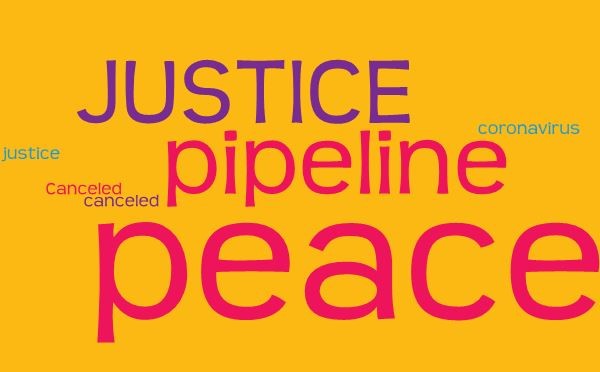
Amid Twin Crises, Two Milestones for Clean Energy and Climate Justice
In the midst of both health and social crises, how might we assess our progress toward greater climate justice and a clean energy economy? We have needed to make the fast-moving pandemic and the urgency of justice reforms in the wake of George Floyd’s murder our top priorities, and we as a country have focused less on the climate crisis even in the middle of a presidential campaign.
One direct, negative result on climate action has been the hit absorbed by the solar industry in Virginia and across the nation. The industry relies on close personal contact between homeowners and others upgrading for energy efficiency and is exactly the kind of business activity and employment that has been most impacted by the pandemic.
A positive result for the climate is an anticipated reduction of around eight percent of greenhouse gas emissions this year. This silver lining is not so bright, as atmospheric carbon dioxide levels still will edge upward, and a rebounding economy will again set us on a path of increasing emissions unless quick action is taken to decarbonize the economy.
The news is not all bad. At least two developments have been very promising. We can be proud that the General Assembly passed the Virginia Clean Economy Act (VCEA) in April. The VCEA will set energy standards designed to make the state independent of fossil fuels by 2050. And, the abandonment of the Atlantic Coast Pipeline (ACP) by Dominion Energy and Duke Energy was announced on July 5. The most compelling reason these energy giants quit the project after spending 3.5 billion dollars on it, is likely the opposition by a coalition of diverse groups whose quality of life would have suffered from construction and operation of the natural gas pipeline: Dominion and Duke found it too costly to battle legal challenges. Another reason is that markets for the natural gas that the pipeline would carry have not materialized. And—tying in with the VCEA—Dominion came to believe its bottom line would benefit more from investment in the clean energy mandated by that major piece of legislation than from investment in gas transmission.
The ACP illustrates the ways in which small communities, in this case rural ones with little wealth or political influence, are often asked to bear the brunt of energy projects that benefit distant cities and large corporations. The small town of Union Hill, Virginia, a majority African American community, was designated as the site of a large compressor station. The community came together to oppose the injustice of forcing it to accept a facility it did not want. Indigenous people along the proposed route also worked to defeat the project, and opposition came from white communities as well.
Among faith organizations, the Unitarian Universalist Association has been a leader in working for climate justice. The pipeline battle illustrates that adverse environmental effects from energy projects frequently fall disproportionately on the less affluent and powerful among us. The disparity is apparent globally when we consider that wealthy, developed nations that have contributed the most to global warming often deny that we have the major responsibility to combat it.
— Will Daniels
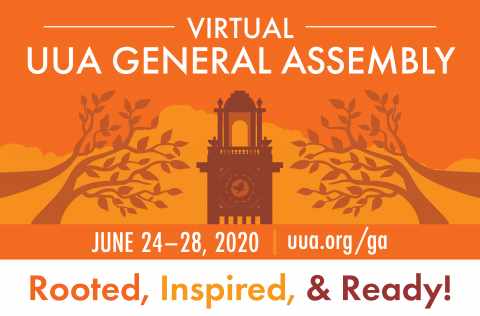
Reflections on the General Assembly
When Russ told us about the General Assembly of the Unitarian Universalist Association (UUA) a few months ago, I had no idea how busy my world was going to become! I had heard great things about the Southeast Unitarian Universalist Summer Institute and how much fun it has been, so I signed up. I knew being a delegate would be a real learning experience.
The virtual General Assembly ran from June 24 to June 28. The theme of the long weekend was “Rooted, Inspired, and Ready!” The Zoom events I attended were interesting and thought provoking. I felt as though I would have enjoyed chatting with others about the classes. It was difficult to choose which of the offered sessions to attend—they all sounded intriguing! I learned terms like “UU the vote” and “vote love, not hatred” in a preview of how UUA may approach the coming November elections.
Author and ESPN senior writer and NPR correspondent Howard Bryant discussed ideas from his book Full Dissidence—Notes from an Uneven Playing Field. This brilliant man spoke from his heart about the racial inequities in daily American life. I was impressed by two retiring assembly co-moderators who discussed how difficult and unprecedented a year 2019–2020 had been for them as leaders.
For Friday fun night, I chose to watch a hilarious show of drag queens and cross dressing, and each act was funnier than the last. Their skits and clothing and special effects were outrageously extravagant entertaining!
On Saturday, I enjoyed a morning worship service with wonderful music and speakers. The main speaker that evening was journalist and author Naomi Klein, the Gloria Steinem Endowed Chair in Media, Culture and Feminist Studies at Rutgers. She has written No is Not Enough: Resisting the New Shock Politics and Winning the World We Need and more recently On Fire: The (Burning) Case for a Green New Deal. Her words inspired my climate activist soul.
Sunday morning brought a beautiful worship service with music that had me madly writing down the names and words to the songs to bring home to our Singers and Players. The speaker Rev. Joan Javier-Duval asked us “How do we ready ourselves for what is being asked of us? How do we keep moving even when we don’t feel ready?” Both were timely questions amidst the pandemic and Black Lives Matter.
I learned that parts of some of the services can be obtained on video, as well as all of the various classes I missed. Perhaps Russ and I will be able to bring you parts of the weekend we found most inspiring. I was so pleased to see the diversity of cultures, lifestyles, and respect for each living being that our denomination is known for, and why I am a member of UUBRidge.
— Ellie Clark
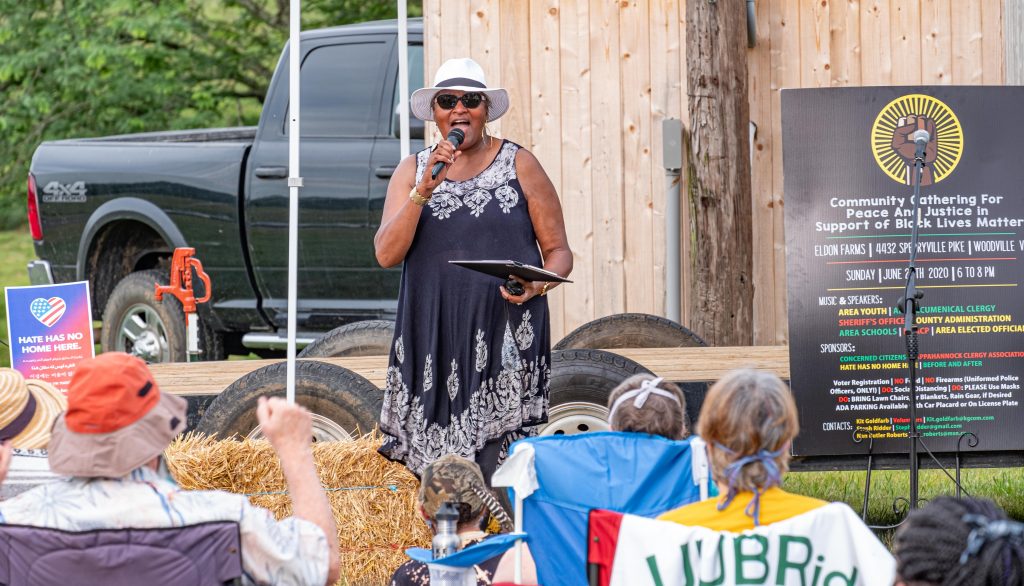
Gathering for Peace and Justice Organizer Nan Butler
Know Justice, Know Peace
On June 28, a crowd estimated at 500 gathered at Eldon Farm in Rappahannock County to support peace and justice and the Black Lives Matter movement. UUBRidge was well-represented in the audience, and Rev. Russ Savage and Rachel Bynum, who serves on the Rappahannock School Board, were among the many inspirational activists and speakers, who included clergy members, students, political office holders and candidates, and others.
Russ spoke of injustice past and present and recited the names of some of the African-Americans killed by police in recent years. Rachel talked of working on the land and thinking of those unnamed, enslaved people who had lived and worked there. Nan Butler Roberts provided insight into a chant commonly spoken during recent demonstrations for racial justice: “No Justice, No Peace” becomes “Know Justice, Know Peace.”
A video of the live-streamed event can be found here.
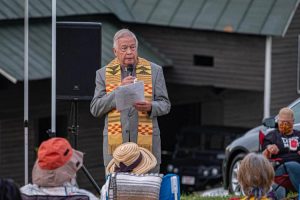
Rev. Russ Savage
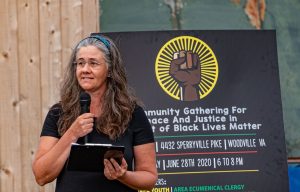
Rachel Bynum
Peace and Justice Gathering photos courtesy of Raymond Boc
— Sue Daniels
To our readers: we invite you to use the comments section below not only to give your thoughts on what you read here, but to recommend things to read, watch, or listen to related to environment and social justice. Also of interest are your own activities or accomplishments in the environment/social justice realm.
Thank you to those who put this together for us. You’ve done a beautiful job portraying this community, it’s diversity and inspiring capacity to come together in agreement on important matters with both playfulness and maturity.
During the past year I’ve become aware of the Religious Naturalist movement. I am experiencing RN and those involved as a way to focus UU environmental and social justice concerns. My hope is to forge a mutually enriching link finding words and deeds crucial to our appreciation and survival here on planet Earth as we evolve together.